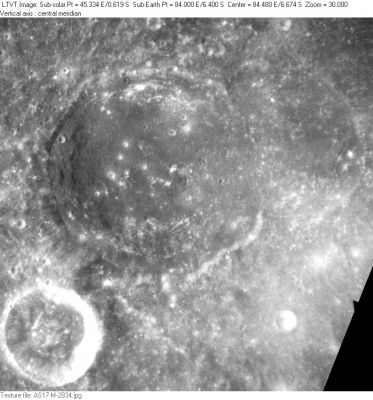Kiess
Contents
Kiess (of the pair Kiess-Widmannstatten in Mare Smythii)
|
Lat: 6.45°S, Long: 84.13°E, Diam: 68.99 km, Depth: 0.8 km, Rükl: 49 |
AS17-M-2834 Kiess is the large crater slightly above and to the left of center, which overlays the smaller Widmannstätten in the upper right. The fresher 30-km crater in the lower left is Kästner S.
Images
LPOD Photo Gallery Lunar Orbiter Images Apollo Images
- Two of Apollo 8's orbital Hasselblad photographs show Kastner S and the chevron-shaped rim of the dark Kiess north-northeast of it : AS08-12-2176 and AS08-12-2177. Research: Danny Caes.
- Pan 7, composed of Apollo 8's orbital Hasselblads AS08-12-2164 to 2177, shows Kiess and Kastner S near the pan's extreme left margin. Research: David Woods and Frank O'Brien (Apollo 8 Flight Journal).
Maps
Description
Wikipedia
Additional Information
- IAU page: Kiess
- Depth data from Kurt Fisher database
- Pike, 1976: 0.8 km
- Westfall, 2000: 0.8 km
Nomenclature
- Named for Carl Clarence Kiess (1887 – 1967), an American astronomer. While working at the Lick Observatory on July 6, 1911, Kiess discovered comet C/1911 N1, which was named after him.
- This name appears on LTO-81B4 (for which it served as the chart title). It does not appear to replace any previous IAU-approved designation. Although it appears in the cumulative list of approved names printed in IAU Transactions XVB, when and how it came to be approved is not entirely clear from the IAU record. Biographical information was unofficially reported in Ashbrook, 1974. - Jim Mosher
- Kastner S, the bright crater south-southwest of Kiess, was also called Cellini on LTO-81B4.
- Kiess and nearby Widmannstätten were called the Wright brothers by NASA personnel (this during the hey-days of the Apollo program).
LPOD Articles
Deep, Young and Ashy A Young, Deep Mare
Bibliography
Kiess and Widmannstätten as the "Wright brothers": NASA SP-330 page 28-12.
Named Featues -- Prev: Kies -- Next: Kimura
